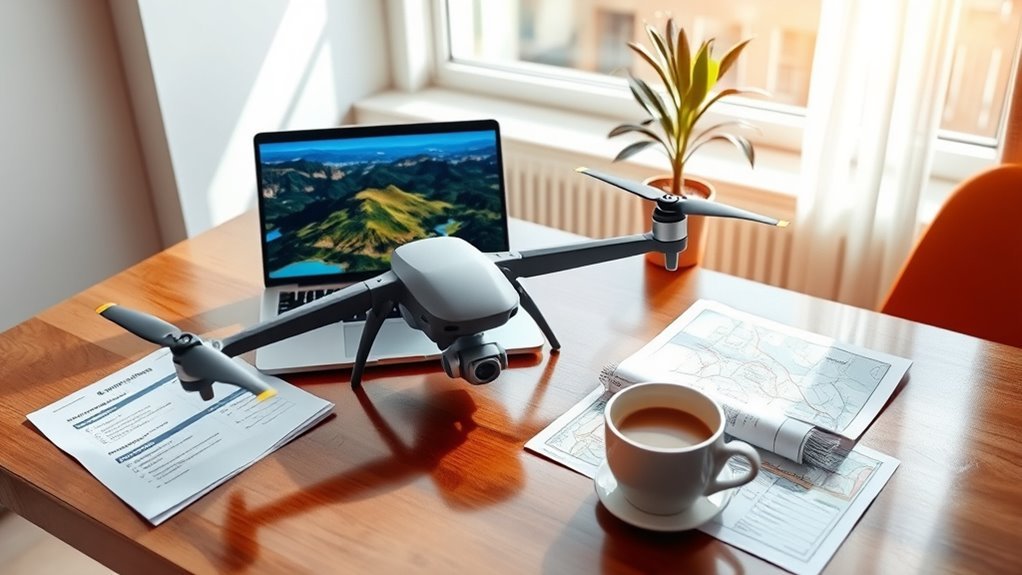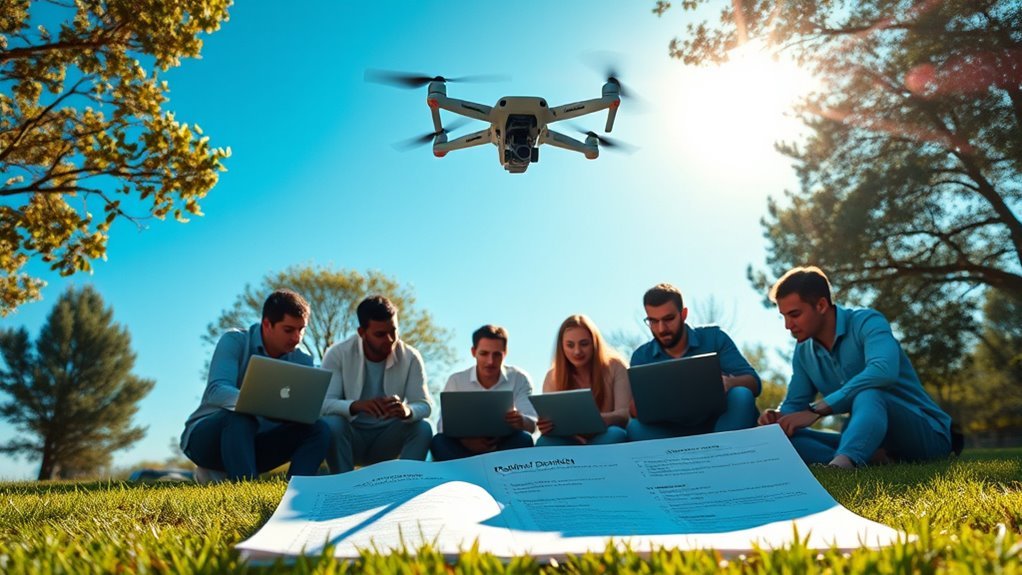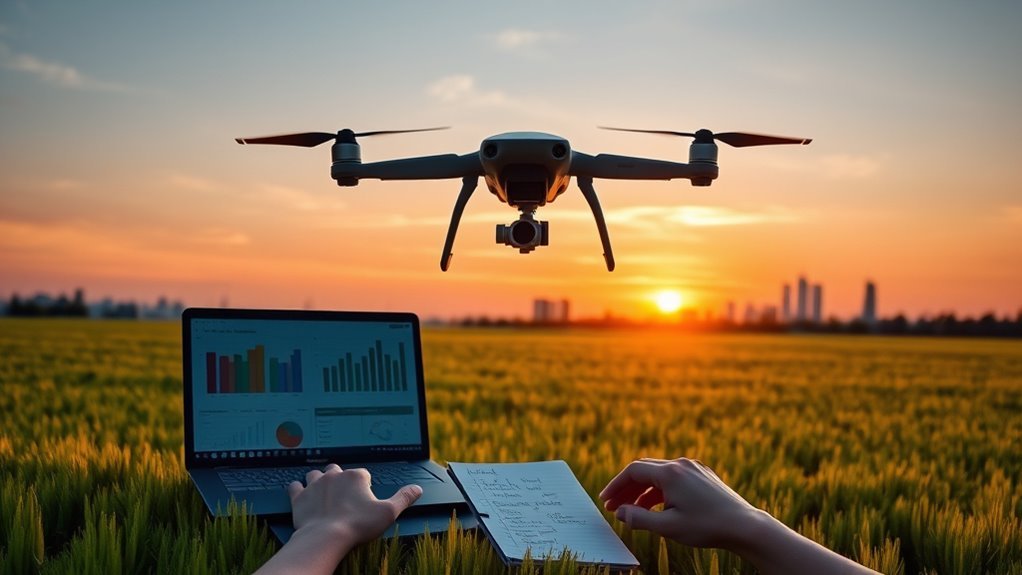Starting a drone business involves strategic planning and understanding market demand. First, you need to analyze sectors like agriculture and real estate for opportunities. Make sure you obtain the necessary licenses, like the Remote Pilot Certificate, and keep up with regulations. Next, choose the right equipment based on your service offerings. Develop an extensive business plan outlining your target audience and marketing strategy, which can set you apart in the industry. There’s more to explore on building a successful drone venture.
Understanding the Drone Industry and Market Demand

As the drone industry continues to evolve, understanding market demand becomes essential for anyone looking to start a drone business. You must engage in thorough market analysis to pinpoint current drone trends and identify potential gaps in the market. This involves researching sectors such as agriculture, real estate, and emergency services, where drones are rapidly gaining traction. By analyzing consumer needs and preferences, you can tailor your offerings to meet these demands, giving you a competitive edge. Keep an eye on technological advancements and regulatory changes, as they can influence market dynamics. Additionally, consider how drone technology can enhance public health initiatives, as this sector presents significant growth potential. Furthermore, understanding the differences between enterprise drones and consumer models can help you better address the unique needs of your target market. Ultimately, aligning your business strategy with these insights will empower you to capitalize on the growing opportunities within the drone industry, paving the way for sustainable success.
Obtaining Necessary Licenses and Certifications

Before launching your drone business, it is vital to navigate the complex landscape of licenses and certifications required by regulatory bodies. Understanding the certification process is key to guarantee regulatory compliance, which not only safeguards your operations but also enhances your credibility in the industry. Start by researching the Federal Aviation Administration (FAA) requirements, including obtaining a Remote Pilot Certificate. You’ll need to pass the Part 107 test, which covers airspace rules and safety protocols. Additionally, consider any local regulations that apply to your specific business model. Staying informed on updates and changes in regulations will help you maintain compliance and avoid potential pitfalls. By mastering these requirements, you can confidently pursue the freedom to operate your drone business effectively.
Choosing the Right Equipment and Technology

Choosing the right equipment and technology is essential for the success of your drone business. You’ll need to take into account various drone types, like quadcopters for aerial photography or fixed-wing models for long-distance surveying. Each type has distinct advantages based on your intended services. Researching equipment costs is vital; don’t just focus on the initial purchase price but also factor in maintenance and upgrades. Evaluate features such as battery life, camera quality, and payload capacity, as they directly impact your operational efficiency. For instance, the longer flight endurance of the DJI Air 3S allows for extended exploration without interruptions. Investing in reliable technology can set you apart from competitors, giving you the freedom to explore diverse markets. Ultimately, the right choices will enhance your capabilities and help you thrive in the growing drone industry. Additionally, understanding flight performance and battery life will ensure you select drones that meet your business needs effectively.
Developing a Business Plan and Strategy
With the right equipment and technology in place, the next step is to develop a thorough business plan and strategy that will guide your drone venture. Defining your target audience and setting realistic financial projections are essential. Here are key elements to include in your plan:
- Market Analysis: Understand your competition and industry trends.
- Value Proposition: Clearly articulate what makes your services unique.
- Revenue Streams: Identify diverse ways to generate income.
- Operational Plan: Outline logistics, staffing, and workflows, ensuring enhanced interoperability among your systems.
- Financial Projections: Estimate costs, revenues, and break-even points.
Creating a solid business plan not only clarifies your vision but also attracts potential investors, ensuring you have the freedom and resources to thrive in the dynamic drone market. Additionally, considering global regulations is crucial for compliance and operational success in various markets.
Marketing Your Drone Services Effectively
As you begin marketing your drone services, it’s essential to develop a strategy that not only highlights your unique offerings but also resonates with your target audience. Start by leveraging social media platforms to showcase stunning visuals from your drone work. Regularly update your profiles with engaging content that tells a story, allowing potential clients to envision the possibilities. Don’t underestimate the power of networking events; they provide an excellent opportunity to connect with industry professionals and potential clients face-to-face. Consider offering demonstrations or workshops to illustrate your expertise. By combining a strong online presence with real-world connections, you’ll create a compelling marketing approach that sets your drone services apart and attracts clients who value creativity and innovation. Additionally, emphasize your commitment to environmental sustainability in your marketing efforts, as this is increasingly important to many clients today. Furthermore, using data from real-time sensor integration can enhance your service offerings by showcasing your ability to monitor and optimize operations effectively.
Frequently Asked Questions
What Are the Common Challenges Faced in Starting a Drone Business?
When starting a drone business, you’ll face regulatory hurdles and high equipment costs. Maneuvering these challenges requires strategic planning and a keen understanding of compliance, ensuring you maintain the freedom to operate effectively in a competitive market.
How Can I Find Clients for My Drone Services?
To find clients for your drone services, utilize networking strategies like attending industry events and joining online forums. Combine these with effective marketing techniques, such as social media campaigns, to attract potential customers seeking innovative solutions.
What Insurance Do I Need for My Drone Business?
When it comes to your drone business, you’ll want to cover all your bases. Liability coverage protects against accidents, while equipment insurance safeguards your gear. Both are essential to keep you flying high without worries.
How Do I Price My Drone Services Competitively?
To price your drone services competitively, consider various pricing strategies. Conduct thorough market research to understand competitors’ rates, analyze customer needs, and adjust your offerings accordingly. This way, you’ll attract clients while ensuring profitability.
What Are the Future Trends in the Drone Industry?
Imagine a bird soaring freely; that’s the future of autonomous drones. As regulations evolve, you’ll find opportunities in delivering goods and enhanced aerial services, ensuring your place in this thriving, innovative landscape awaits you.

